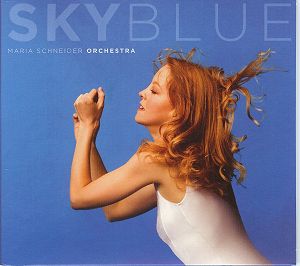The ‘Pretty’ Road [13:23]
Aires de Lando [9:56]
Rich’s Piece [9:29]
Cerulean Skies [21:55]
Sky Blue [8:06]
All written and arranged by Maria Schneider
Tony Kadleck, Jason Carder, Laurie Frink,
Ingrid Jensen (trumpet, flugelhorn), Keith
O’Quinn, Ryan Keberle, Marshall Gilkes (trombone),
George Flynn (bass trombone, contrabass trombone),
Steve Wilson, Charles Pillow (reeds), Rich
Perry (tenor, flute), Donny McCaslin (tenor,
clarinet), Scott Robinson (baritone, clarinet,
bass clarinet), Frank Kimbrough (piano), Gary
Versace (accordion), (Ben Monder (guitar),
Jay Anderson (bass), Clarence Penn (drums),
Gonzalo Grau, Jon Wikan (cajon, palmas, percussion),
Luciana Souza (voice)
Recorded January 6-9, 2007, Legacy Recording
Studios, New York
To say that Maria Schneider’s
writing often makes one think of Gil Evans
(with whom she worked at one time) is not
to label her derivative; it is merely a way
of getting one’s bearings, a way of making
it clear that her music belongs firmly in
a distinguished jazz tradition (there are,
after all, reminiscences of Ellington too).
But her ears and her mind
stretch beyond ‘pure’ jazz and the music is
all the better for that openness to other
idioms and musical languages. So, for example,
‘Aires de Lodos’ draws on Schneider’s experience
of hearing the Peruvian music called lando,
music which, in her words is "felt in
polyrhythmic patterns of 12/8 over 6/4".
That music was, more or less unconsciously,
recalled by Schneider when fulfilling a commission
for the Los Angeles Philharmonic Association.
The piece involves some very demanding writing
for clarinet, carried off with panache by
Scott Robinson, over complex and constantly
changing polyrhythms. The results are exhilarating
and fascinating. In the piece which starts
off the album, ‘The "Pretty" Town,
featuring a lengthy solo by Ingrid Jensen
on flugelhorn inescapably offers reminders
of collaborations between Miles Davis and
Gil Evans. But there’s no question of mere
imitation; neither Schneider as writer/arranger
or Jensen as a soloist is anything like a
mere clone. Indeed it is a characteristic
quality of Schneider’s writing on this album
that she seems always to have been thinking
very much of the individuality of the featured
soloist, writing for them, in the most literal
sense, at the very same time that she is working
out the implications of her own musical ideas
and imaginations. But then that is precisely
what both Ellington and Evans did. She says
of ‘Rich’s Piece’, featuring tenorist Rich
Perry, that it "came to me not as notes,
but as sounds-the sound of Rich Perry".
Even without hearing that from the composer
herself, one would have suspected it from
the music itself.
Schneider has a lovely ear
for the textural detail, whether it be the
accordion of Gary Versace in ‘Aires de Lando’,
the guitar of Ben Monder in ‘Cerulean Skies’
or the wonderfully atmospheric resonances
of the deep trombones, bass trombone and contrabass
trombone, played by George Flynn, especially
at the close of ‘Rich’s Piece’. Orchestral
jazz writing in which all the orchestral work,
all the details of the accompaniment, are
as compelling as the solo improvisations is
a relatively rare phenomenon – that is certainly
the case here.
Rich Perry sustains the slow,
at times almost static, mood of his ‘Piece’
superbly, phrases and lines sustained over
or against a slowly shifting orchestral backdrop.
In ‘Sky Blue’, the soprano sax of Steve Wilson
is featured, another slow piece, in which
we are given every opportunity to relish the
aural textures of the writing. ‘Sky Blue’
was written after the death of a friend, and
there is great tenderness and love in the
music, as Wilson’s soprano sound, more rounded
in tone than that of many jazz soprano players,
decorates and rides above some more rich (but
never merely rhetorical or self indulgent)
orchestral writing. There is a gratifying
sense of wholeness, of logical movement from
beginning to end about ‘Sky Blue’.
‘Cerulean Skies’ is much
the longest piece here, and in some ways the
most adventurous too. It was commissioned
for Peter Sellars’ New Crowned Hope Festival
in Vienna. It is a beautiful evocation of
trees richly populated by a variety of birds.
Some use is made of prerecorded bird song,
but any associations with, say Rautavaara’s
Cantus Arcticus should be quickly dismissed
from the mind. This is about as far from Finnish
bleakness (however beautiful) as we could
very well be. It is lush, rich, dense music,
full of warmth and sunshine. As well as a
recording, heard at the piece’s close of the
cerulean warbler, we hear some impressive
imitations (produced vocally, instrumentally
or by the use of whistles) of other bird song.
Above and between these sounds there are solos
by Donny McCaslin on tenor sax - assured,
deliberative and powerful, finally soaring
up and away; by Gary Versace on accordion,
quiet, unassertive, wonderfully atmospheric
and evocative (Versace’s performance ought
to be enough to challenge the prejudices of
the anti-accordion school of thought); a brief
wordless contribution by Luciana Souza and,
finally, Charles Pillow on alto sax, strikingly
radiant, buoyed up by the orchestra like a
bird carried higher by the rising air. But
the birds themselves have the last word. The
whole thing is a remarkably successful jazz
tone-poem.
All in all, a valuable collection
of what is, for all my earlier mentions of
Evans and Ellington, very distinctive music.
It benefits from a superb recorded sound,
in which every detail is audible, in which
warmth and transparency are perfectly combined.
Glyn Pursglove
